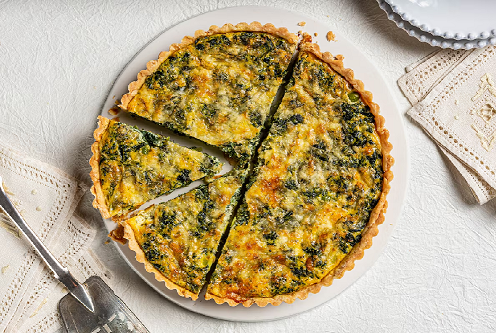Here’s our take on the quiche recipe unveiled by the British royal household to commemorate King Charles III’s coronation. It features a generous filling of spinach, beans, and a generous amount of cheddar cheese, ideally a sharp, aged variety from England. Feel free to use your preferred homemade or store-bought pie crust, ensuring you have enough for a single 9-inch crust. Leftovers of Coronation Quiche can be refrigerated for up to 3 days. This recipe has been adapted from one shared by the British royal household
Ingredients:
Servings: 6-8 (makes one 9-inch quiche)
- Unsalted butter, for greasing
- All-purpose flour, for dusting (optional)
- 1 unbaked single pie crust for a 9-inch pie, store-bought or homemade (see related recipes)
- 10 ounces (280 grams) frozen chopped spinach
- 1/2 cup (60 grams) frozen shelled edamame (may substitute peas)
- 1 1/2 cups (125 grams) grated aged cheddar cheese, preferably English
- 3 large eggs
- 1/2 cup (120 milliliters) heavy cream
- 1/2 cup (120 milliliters) milk (any percentage)
- 1 tablespoon chopped fresh tarragon (may substitute 1 or a mix of other leafy herbs, such as oregano, mint or basil)
- 1/2 teaspoon fine salt
- 1/2 teaspoon freshly ground black pepper
Directions to make Coronation Quiche:
- Lightly grease a 9-inch removable-bottom tart pan with butter.
- If not using a store-bought crust: Dust the work surface generously with flour. Roll the dough until it’s 12 inches wide and just slightly thicker than 1/8-inch, giving it a quarter-turn every so often. Gently drape it over the tart pan, pressing it into the bottom and sides. Leave about a 1/2- to 1-inch overhang of dough. Refrigerate for 30 minutes.
- Preheat oven to 375 degrees. Position racks in the middle and bottom third. Prepare a large, rimmed baking sheet.
- Transfer the tart pan to the prepared baking sheet. Line the crust with parchment paper or foil and fill with pie weights. Bake on the bottom rack for 15 minutes.
- Remove parchment/foil and weights. Prick the bottom of the crust all over with a fork. Return to the oven for 10 to 15 minutes until edges are golden and bottom is dry.
- Trim away excess pie crust using a rolling pin.
- Cook spinach and edamame according to package instructions. Wring out excess water from spinach.
- Reduce oven temperature to 350 degrees.
- Layer half of the cheese evenly over the crust, followed by spinach and edamame.
- Whisk together eggs, heavy cream, milk, tarragon, salt, and pepper. Pour into crust, ensuring it fills around the vegetables. Sprinkle remaining cheese on top.
- Bake for 35 to 40 minutes until filling is puffed and set.
- Cool the coronation quiche on a wire rack for at least 30 minutes before serving. Remove fluted sides of the pan, cut, and serve.
Nutritional benefits of some key ingredients used to make Coronation Quiche:
Spinach:
Spinach is indeed a powerhouse of nutrients, rich in iron, vitamin C, E, potassium, and magnesium. As part of a balanced diet, it contributes to supporting immune function, aids digestion, and may even possess anticancer properties. However, moderation is key for certain individuals.
The potential health benefits of consuming spinach are vast, including improved blood glucose control in people with diabetes, reduced cancer risk, and enhanced bone health. This leafy green vegetable is not only nutritious but may also promote skin, hair, and bone health due to its abundance of vitamins and minerals.
Here are some fast facts about spinach:
- A 100-gram serving of spinach contains 28.1 milligrams of vitamin C, providing 34% of a person’s daily recommended intake.
- Spinach is a good source of iron, potassium, vitamin E, and magnesium.
- Different cooking methods can alter the nutritional profile of spinach.
In one cup of raw spinach, you’ll find:
- 7 calories
- 0.86 grams of protein
- 29.7 milligrams of calcium
- 0.81 grams of iron
- 24 milligrams of magnesium
- 167 milligrams of potassium
- 141 micrograms of vitamin A
- 58 micrograms of folate
Additionally, spinach contains vitamin K, fiber, phosphorus, and thiamine. Its calories mostly come from protein and carbohydrates. Incorporating spinach into your diet can offer a wide array of health benefits and contribute to overall well-being.
Cheddar Cheese:
Cheddar cheese is indeed a calcium-rich dairy product, which is essential for building strong bones and plays a crucial role in blood clotting and other vital functions.
In addition to calcium, cheddar cheese offers several other nutrients, including iron, vitamin A, and vitamin K. Just one cubic inch of cheddar cheese contains approximately 69 calories, 4 grams of protein, 6 grams of fat, and less than 1 gram of carbohydrates.
There are several potential health benefits associated with consuming cheddar cheese:
- Lower cholesterol: Despite its saturated fat content, moderate consumption of cheddar cheese may actually help lower cholesterol levels, especially in middle-aged adults.
- Bone strength: Cheddar cheese is an excellent source of calcium, a key nutrient for promoting bone health. Diets rich in calcium are associated with a lower risk of osteoporosis. Additionally, the vitamin K present in cheddar cheese plays a vital role in supporting bone health.
- Healthy teeth: While regular dental care is crucial for maintaining oral health, diet also plays a significant role. Opting for cheese as a snack instead of sugary treats can help reduce the risk of cavities and promote dental health.
Incorporating cheddar cheese into a balanced diet can provide a range of health benefits, from supporting bone health to promoting overall well-being. As with any food, moderation is key to enjoying its benefits while maintaining a healthy lifestyle.
Eggs:
Eggs are indeed deserving of their “superfood” status due to their impressive nutritional profile and numerous health benefits.
Benefits:
Here are 9 confirmed health benefits of eggs supported by human studies:
- Complete protein source: A whole egg provides all the essential amino acids needed by the body, making it an excellent source of high-quality protein.
- Supports eye health: Eggs contain antioxidants like lutein and zeaxanthin, which have been linked to improved eye health and reduced risk of age-related macular degeneration.
- Raises HDL cholesterol: Despite being high in cholesterol, eggs have been found to raise levels of HDL (the “good”) cholesterol in the blood, which is beneficial for heart health.
- Contains choline: Eggs are a significant dietary source of choline, an essential nutrient important for brain health, metabolism, and liver function.
- Linked to reduced risk of heart disease: Studies suggest that moderate egg consumption is not associated with an increased risk of heart disease and may even have a protective effect against cardiovascular problems.
- Omega-3 enriched eggs: Pastured or omega-3 enriched eggs contain higher levels of omega-3 fatty acids, which are beneficial for heart health and may help lower triglyceride levels.
- Filling and aids in weight loss: Eggs are a satisfying and nutrient-dense food that can help reduce calorie intake, leading to better weight management and satiety.
- Versatile and convenient: Eggs offer ease of preparation, versatility, and can seamlessly blend into numerous recipes, making them a convenient option for crafting nutritious meals or quick snacks. Vitamin E, phosphorus, selenium, and a host of others.
- Eggs are abundant in essential nutrients, comprising vitamins A, various B vitamins like B12, riboflavin, and folate, along with vitamin D, vitamin E, phosphorus, selenium, and a host of others.
Summary:
Overall, eggs are an incredibly nutritious and health-promoting food that can be enjoyed as part of a balanced diet. Whether you prefer them scrambled, boiled, or as part of a delicious recipe, eggs provide a wide range of essential nutrients and health benefits.
